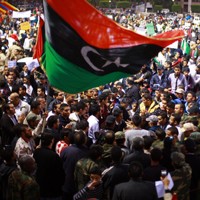The recent national elections in Libya have drawn attention to the country’s postconflict transition. But overshadowed by the international community’s ongoing failure to contain the crisis in Syria, the positive international role in Libya has gone largely overlooked.
The success of Libya’s elections for a National Congress is in part due to the deep engagement of the international community, led by the United Nations Support Mission in Libya (UNSMIL). Bucking the trend of many recent postwar interventions, however, this assistance has not come in the form of a large-scale operation. As such, it may present a new model for postconflict settings, at a time when old models -- as in Afghanistan and Haiti -- are coming under increasing strain.
Plans for a postconflict international presence in Libya were laid before the fighting there had ended, in anticipation of the fall of former Libyan leader Moammar Gadhafi. Regional politics dictated against troops from NATO and the European Union taking part in the postconflict mission, while strains on NATO’s budget and capacities in particular did not leave it eager for an extended role in Libya. Meanwhile, regional organizations such as the African Union and Arab League lacked the capabilities to put together an effective mission. This left the U.N. in the lead role on multilateral assistance.

